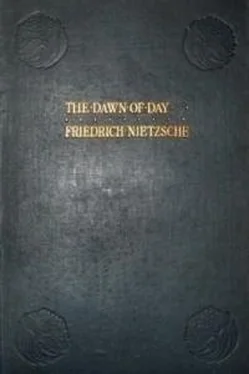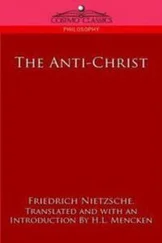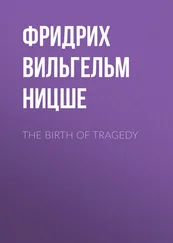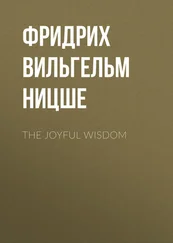540.
LEARNING.—Michelangelo considered Raphael’s genius as having been acquired by study, and upon his own as a natural gift: learning as opposed to talent; though this is mere pedantry, with all due respect to the great pedant himself. For what is talent but a name for an older piece of learning, experience, exercise, appropriation, and incorporation, perhaps as far back as the times of our ancestors, or even earlier! And again: he who learns forms his own talents, only learning is not such an easy matter and depends not only upon our willingness, but also upon our being able to learn at all.
Jealousy often prevents this in an artist, or that pride which, when it experiences any strange feeling, at once assumes an attitude of defence instead of an attitude of scholarly receptiveness. Raphael, like Goethe, lacked this pride, on which account they were great learners, and not merely the exploiters of those quarries which had been formed by the manifold genealogy of their forefathers. Raphael vanishes before our eyes as a learner in the midst of that assimilation of what his great rival called his “nature”: this noblest of all thieves daily carried off a portion of it; but before he had appropriated all the genius of Michelangelo he died—and the final series of his works, because it is the beginning of a new plan of study, is less perfect and good, for the simple reason that the great student was interrupted by death in the midst of his most difficult task, and took away with him that justifying and final goal which he had in view.
541.
HOW WE SHOULD TURN TO STONE.—By slowly, very, very slowly, becoming hard like a precious stone, and at last lie still, a joy to all eternity.
542.
THE PHILOSOPHER AND OLD AGE.—It is not wise to permit evening to act as a judge of the day; for only too often in this case weariness becomes the judge of success and good will. We should also take the greatest precautions in regard to everything connected with old age and its judgment upon life, more especially since old age, like the evening, is fond of assuming a new and charming morality, and knows well enough how to humiliate the day by the glow of the evening skies, twilight and a peaceful and wistful silence. The reverence which we feel for an old man, especially if he is an old thinker and sage, easily blinds us to the deterioration of his intellect, and it is always necessary to bring to light the hidden symptoms of such a deterioration and lassitude, that is to say, to uncover the physiological phenomenon which is still concealed behind the old man’s moral judgments and prejudices, in case we should be deceived by our veneration for him, and do something to the disadvantage of knowledge. For it is not seldom that the illusion of a great moral renovation and regeneration takes possession of the old man. Basing his views upon this, he then proceeds to express his opinions on the work and development of his life as if he had only then for the first time become clearsighted—and nevertheless it is not wisdom, but fatigue, which prompts his present state of well–being and his positive judgments.
The most dangerous indication of this weariness is above all the belief in genius, which as a rule only arises in great and semi–great men of intellect at this period of their lives: the belief in an exceptional position, and exceptional rights. The thinker who thus believes himself to be inspired by genius henceforth deems it permissible for him to take things more easily, and takes advantage of his position as a genius to decree rather than to prove. It is probable, however, that the need felt by the weary intellect for alleviation is the main source of this belief—it precedes it in time, though appearances may indicate the contrary.
At this time too, as the result of the love which all weary and old people feel for enjoyment, such men as those I am speaking of wish to enjoy the results of their thinking instead of again testing them and scattering the seeds abroad once more. This leads them to make their thoughts palatable and enjoyable, and to take away their dryness, coldness, and want of flavour; and thus it comes about that the old thinker apparently raises himself above his life’s work, while in reality he spoils it by infusing into it a certain amount of fantasy, sweetness, flavour, poetic mists, and mystic lights. This is how Plato ended, as did also that great and honest Frenchman, Auguste Comte, who, as a conqueror of the exact sciences, cannot be matched either among the Germans or the Englishmen of this century.
There is a third symptom of fatigue: that ambition which actuated the great thinker when he was young, and which could not then find anything to satisfy it, has also grown old, and, like one that has no more time to lose, it begins to snatch at the coarser and more immediate means of its gratification, means which are peculiar to active, dominating, violent, and conquering dispositions. From this time onwards the thinker wishes to found institutions which shall bear his name, instead of erecting mere brain–structures. What are now to him the ethereal victories and honours to be met with in the realm of proofs and refutations, or the perpetuation of his fame in books, or the thrill of exultation in the soul of the reader? But the institution, on the other hand, is a temple, as he well knows—a temple of stone, a durable edifice, which will keep its god alive with more certainty than the sacrifices of rare and tender souls. [17] This, of course, refers to Richard Wagner, as does also the following paragraph.—TR.
Perhaps, too, at this period of his life the old thinker will for the first time meet with that love which is fitted for a god rather than for a human being, and his whole nature becomes softened and sweetened in the rays of such a sun, like fruit in autumn. Yes, he grows more divine and beautiful, this great old man,—and nevertheless it is old age and weariness which permit him to ripen in this way, to grow more silent, and to repose in the luminous adulation of a woman. Now it is all up with his former desire—a desire which was superior even to his own ego—for real disciples, followers who would carry on his thought, that is, true opponents. This desire arose from his hitherto undiminished energy, the conscious pride he felt in being able at any time to become an opponent himself,—nay, even the deadly enemy of his own doctrine,—but now his desire is for resolute partisans, unwavering comrades, auxiliary forces, heralds, a pompous train of followers. He is now no longer able to bear that dreadful isolation in which every intellect that advances beyond the others is compelled to live. From this time forward he surrounds himself with objects of veneration, companionship, tenderness, and love; but he also wishes to enjoy the privileges of all religious people, and to worship what he venerates most highly in his little community—he will even go as far as to invent a religion for the purpose of having a community.
Thus lives the wise old man, and in living thus he falls almost imperceptibly into such a deplorable proximity to priestly and poetic extravagances that it is difficult to recollect all his wise and severe period of youth, the former rigid morality of his mind, and his truly virile dread of fancies and misplaced enthusiasm. When he was formerly in the habit of comparing himself with the older thinkers, he did so merely that he might measure his weakness against their strength, and that he might become colder and more audacious towards himself; but now he only makes this comparison to intoxicate himself with his own delusions. Formerly he looked forward with confidence to future thinkers, and he even took a delight in imagining himself to be cast into the shade by their brighter light. Now, however, he is mortified to think that he cannot be the last: he endeavours to discover some way of imposing upon mankind, together with the inheritance which he is leaving to them, a restriction of sovereign thinking. He fears and reviles the pride and the love of freedom of individual minds: after him no one must allow his intellect to govern with absolute unrestriction: he himself wishes to remain for ever the bulwark on which the waves of ideas may break—these are his secret wishes, and perhaps, indeed, they are not always secret.
Читать дальше











